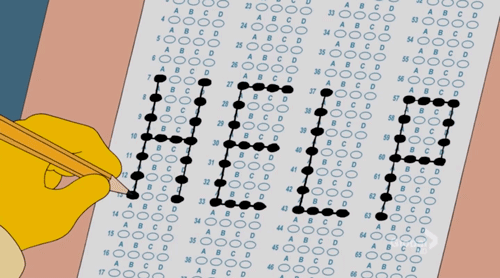ACT Plans to Expand Online Testing in US
After an initial pilot in December, ACT hopes to offer its exam in a computer-based format alongside paper-and-pencil in more testing centers across the US into 2024.
Without much fanfare (in stark contrast to College Board’s announcements), ACT released details of its plan to expand access to online, computer-based testing in the US, starting in December.
Since 2018, the ACT has been available exclusively in an online format, but this format had been restricted domestically to specific state and district school-day administrations. ACT’s news means online testing will soon be available on national test dates, offered seven times annually on Saturdays.
Students and families will likely be interested in these main details:
ACT’s test content, structure, and timing remains unchanged from the traditional paper test.
The online ACT proceeds linearly, just like a paper test, and is not adaptive like the digital SAT.
Beginning in July, students may see the option to register for a “Computer” format during registration for the December 9th ACT. (This option will likely be added in early 2024 for other test dates.)
Students take the online ACT at approved testing centers and on center-managed devices. The online ACT is not available remotely.
There is a built-in calculator on the online ACT, but students are permitted to bring their own approved calculators. They are also permitted to use provided scratch paper.
Many accommodations are more easily accessed, being built in to the testing platform. Tools of note include color choice and contrast, magnification, line reader, highlighter, answer masking and eliminator, mark an item for review, and time indicator.
Cost and registration processes will be identical for the “Computer” and “Paper” formats of the ACT.
Students can change their format preference after registering, for an additional fee.
KEY Takeaways
Although the online ACT has been (relatively seamlessly) deployed internationally for years, ACT responded to College Board’s plans to update the SAT for a digital environment by touting the stability and reliability of their paper test. Since January, College Board has launched a successful campaign around the benefits of their shorter, adaptive exam. So ACT’s change represents a defensive move to preserve market position – not a strategic, offensive one.

Should students be excited about the online ACT? Not really. It’s true that Covid-era remote schooling accelerated trends in digital education, so some students (especially younger ones) may find themselves more comfortable with a computer-based standardized test than a conventional paper exam, with its Scantron technology and No. 2 pencils.
That said, ACT has missed an opportunity in our view to genuinely consider, then elevate students’ testing experience. The online ACT is essentially a recreation of the paper test on a computer screen. In trialing the testing platform, our team encountered headaches around scrolling on data displays in the Science section, the non-sticky annotation tool on Reading passages, and redrawing geometric figures on scratch paper during the Math section.
Unless your student has a compelling reason (such as scoring higher on the online ACT than the paper ACT and preferring it to the SAT), we recommend opting for “Paper” every time.
Looking for top-notch ACT test prep tutoring, group classes, and advice? You’re in the right place – reach out to our team to get started with an expert tutor today.
Confused by the Enhanced ACT (September 2025)? Learn how to register, compare paper vs online testing, navigate optional Science and Writing, find seats, and use My Answer Key to boost scores with an expert ACT tutor at North Avenue Education.
Independent research is becoming one of the most compelling ways students stand out in selective college admissions. We’ve partnered with Lumiere Education, a highly vetted research mentorship program connecting students with PhD researchers from top universities. Learn why we recommend Lumiere – and how to explore whether it’s a strong fit for your student.
Executive function coaching helps students close the knowing-doing gap through autonomy, data-based routines, and small experiments that build lasting study skills.
Learn how executive function coaching builds planning, organization, time management, and study skills so students stop procrastinating and follow through.
Learn why starting SAT or ACT test prep with a full-length diagnostic practice test gives you a true baseline score, clarifies which exam fits you, and makes your study plan smarter.
Learn how to master digital SAT Math with algebra, advanced math, geometry, and data skills, smart Desmos use, and time-saving strategies – plus guidance on score reports, study plans, and when to seek out the help of a personalized 1:1 SAT tutor.
Learn how to master SAT Reading on the digital SAT with expert strategies for Craft & Structure and Information & Ideas question types, pacing tips, Bluebook practice, and tutoring to build comprehension, confidence, and scores.
Master SAT Writing with crisp grammar, punctuation, and rhetoric strategies. Learn to predict answers, prefer concise choices, and review mistakes with official practice. Read on to explore these insights and more in Part 2 of our series on everything you need to score well on the SAT.
Discover expert SAT Reading strategies from our team of seasoned tutors. Learn how personalized, high-level SAT tutoring builds critical reading skills, boosts comprehension, and maximizes test-day confidence for top-tier college admissions success.
Access the new Class of 2026 National Merit PSAT/NMSQT cutoff scores, with expert analysis of West Coast trends — and tips for students targeting Semifinalist status.
Learn how to get better at writing essays with timed writing practice: use timed writing prompts, timed writing examples, and apply timed writing tips to prepare, run a timed write, and craft a timed essay.
Learn when PSAT scores come out in 2025, how National Merit works, and the best PSAT study tips, classes, and tutoring to prepare.
Discover why taking the ACT Science section is crucial, even though it’s now optional, and see how it impacts college admissions and your future.
Wondering if you can retake the SAT or ACT? Learn how many times you can take the SAT/ACT, the costs of retaking, and strategies to improve your score. Get answers on retesting policies, college score reporting, and prep tips for success.
Learn what changed with the April 2025 ACT launch, how students were affected, and how to best prepare for the new digital, streamlined format.
This blog post serves as a one-stop guide to help students, families, and counselors understand what ACT’s My Answer Key includes, who can access it, why it’s such a powerful study tool, and how to order it – step by step.
Ensure a stress-free ACT test day with this comprehensive checklist. Learn what to bring, what to avoid, and essential test-day tips to help you perform at your best.
Explore the 2025 ACT test changes, including superscoring policy updates, university admissions implications, and content rebalancing. Get expert advice tailored for students and educators to navigate these enhancements effectively.
Understanding PSAT and PSAT 10 scores helps juniors and sophomores gauge SAT readiness, consider ACT options, and plan effective prep.
The ACT is evolving, and the updates rolling out in 2025 will bring some exciting and impactful changes. If you’re planning to take the test soon, here’s everything you need to know about what’s new, how it will affect your prep, and what you can do to stay ahead.
Navigating the SAT can be challenging for any student, but for those with learning differences, the hurdles can feel even more daunting.
Learn how to tackle the unique challenge of time pressure on standardized tests. Discover strategies to improve your pacing and maximize your performance under the clock.
In the competitive world of standardized testing, staying ahead means adapting to change. This year, both SAT and ACT embrace shorter as better.
The December SAT marks the end of an era. This will be the final iteration of the paper-based SAT, as the test shifts to an entirely digital format in March 2024.
In an era when many colleges have shifted to test-blind or test-optional admissions policies, you may associate test scores merely with securing merit aid or scholarships. However, their significance extends far beyond financial assistance. In fact, because test scores remain powerful indicators of a student's academic potential, raising your SAT or ACT scores makes you a more viable applicant for admission, thus opening doors to a world of educational opportunities.
The SAT is on the verge of a major transformation as it embraces a digital format. This shift is set to shake up the way students approach the test, reinforcing the importance of using the most effective resources available when preparing for the SAT.
Now more than ever, the PSAT plays a crucial role in preparing high schoolers for the SAT. As both tests transition to a digital format this fall and next spring, it's important for students to get an overview of the digital PSAT's nuances to prepare effectively for it as well as future standardized tests.
After an initial pilot in December, ACT hopes to offer its exam in a computer-based format alongside paper-and-pencil in more testing centers across the US into 2024.
It's common to feel anxiety and uncertainty before the PSAT or SAT. Here are a few key differences between the two tests to know in order to calm your nerves!
The College Board provides a sample PSAT score report, which is a helpful way to become familiar with the different components of your score. Each report begins with a cover page, including the student’s name, high school, and other identifying information. But the second page is where the real information begins..






























